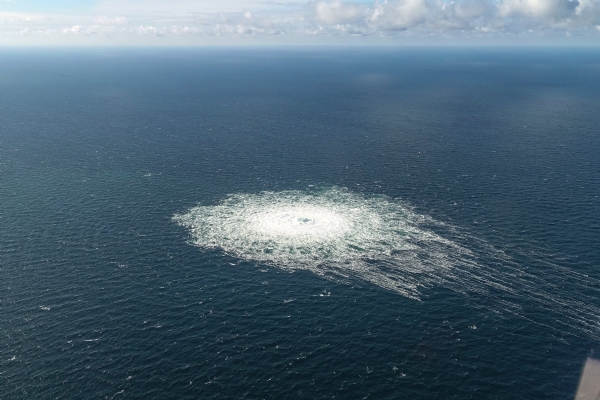Sabotage or accident? Gas pipeline bursts in the Baltic sea
European leaders and experts pointed to possible sabotage amid the energy standoff with Russia provoked by the war in Ukraine. Although filled with gas, neither pipeline is currently supplying it to Europe.
Total Views |
Brussels, Sept 28: Denmark said Tuesday it believed "deliberate actions" by unknown perpetrators were behind big leaks - which seismologists said followed powerful explosions - in two natural gas pipelines running under the Baltic Sea from Russia to Germany.

European leaders and experts pointed to possible sabotage amid the energy standoff with Russia provoked by the war in Ukraine. Although filled with gas, neither pipeline is currently supplying it to Europe.
"It is the authorities' clear assessment that these are deliberate actions -- not accidents," Danish Prime Minister Mette Frederiksen said. But she added that "there is no information indicating who could be behind it." Frederiksen also rejected the suggestion that the incident was an attack on Denmark, saying the leaks occurred in international waters. The incident overshadowed the inauguration of a long-awaited pipeline that will bring Norwegian gas to Poland to bolster the continent's energy independence from Moscow. The first explosion was recorded early Monday southeast of the Danish island of Bornholm, said Bjorn Lund, director of the Swedish National Seismic Network. A second, stronger blast northeast of the island that night was equivalent to a magnitude-2.3 earthquake. Seismic stations in Denmark, Norway, and Finland also registered the explosions. "There's no doubt, this is not an earthquake," Lund said. On Wednesday, Danish defense minister Morten Bodskov will travel to Brussels to discuss the leaks with NATO chief Jens Stoltenberg. Denmark's Foreign Minister Jeppe Kofod said nearby Sweden, Germany and Poland have been kept informed, and "we will inform and reach out to Russia in this case." He said Denmark's foreign intelligence service didn't see any increased military threat against Denmark after the three leaks on the Nord Stream 1 and 2 pipelines. They created a foamy white area on the water's surface, images released by Denmark's military show. Danish Energy Minister Dan Jorgensen said that "we cannot say how long the leak will go" on as the gas has not been turned off. There was no indication when the gas would be turned off. The German operator of the pipelines, Nord Stream AG, said it's preparing a survey to assess the damage in cooperation with local authorities. "Currently, it is not possible to estimate a timeframe for restoring the gas transport infrastructure," a company statement said. "The causes of the incident will be clarified as a result of the investigation." In Sweden, acting Prime Minister Magdalena Andersson said "it is probably a case of sabotage," but not an attack on Sweden. Andersson added that neighboring oil-rich Norway "has informed us about increased drone activity in the North Sea and the measures they have taken in connection with it." Foreign Minister Ann Linde said that Sweden "(is) not ruling out any scenarios and we will not speculate about motive or actor." The escaped natural gas is made up almost entirely of methane - the second biggest contributor to climate change after carbon dioxide. David Hastings, a retired chemical oceanographer in Gainesville, Florida, said much of the gas would rise through the sea and enter the atmosphere. "There is no question that the largest environmental impact of this is to the climate because methane is a really potent greenhouse gas," he said. According to United Nations data, methane is 82.5 times worse for the climate than carbon dioxide over a 20-year time frame, because it so effectively absorbs the heat of the sun.
Polish Prime Minister Mateusz Morawiecki called the events "an act of sabotage." During a ceremony in northwestern Poland, Morawiecki, Denmark's Frederiksen, and Polish President Andrzej Duda symbolically opened the valve of a yellow pipe belonging to the Baltic Pipe, a new system sending Norwegian gas across Denmark to Poland.
"The era of Russian domination in the gas sphere is coming to an end," Morawiecki declared. "An era that was marked by blackmail, threats, and extortion." No official presented evidence of what caused the leaks, but with distrust of Russia running high, some feared Moscow sabotaged its own infrastructure out of spite or to warn that pipelines are vulnerable to attack. The leaks raised the stakes on whether energy infrastructure was being targeted and led to a small bump in natural gas prices.

